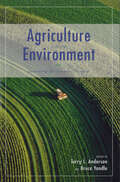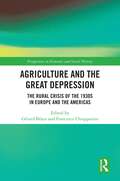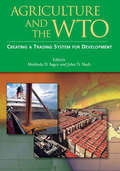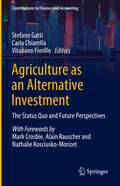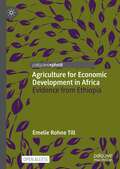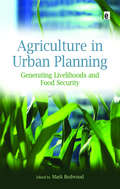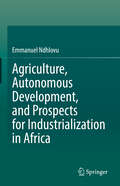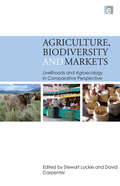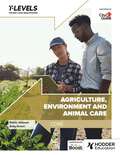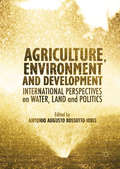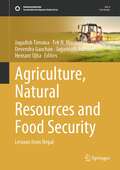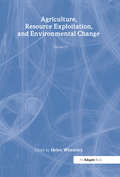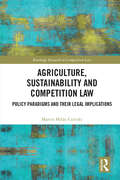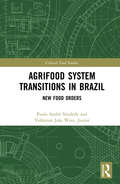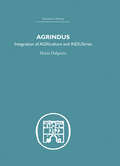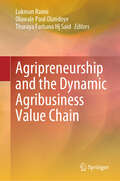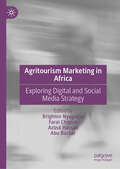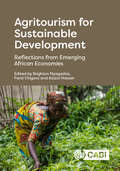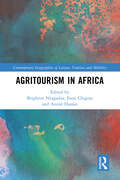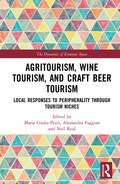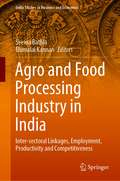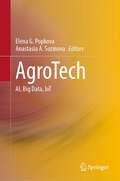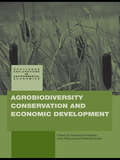- Table View
- List View
Agriculture and the Environment: Searching for Greener Pastures
by Terry L. Anderson Bruce YandleAlthough US agriculture is the envy of the world, there is a growing gap between what is and what could be produced. The gap is due in part to a growing morass of environmental regulations, which limit US food production without necessarily improving environmental quality. In this compilation, leading experts examine a range of questions posed by these constraints and offer ideas for reform.Authors explore whether we are really running out of prime farmland; how best to preserve environmentally sensitive land, and for how long; whether controls on agricultural land use can prevent urban sprawl; whether chemicals that contribute to agricultural productivity are harmful to the environment; the connections between genetically modified crops and human health; how taxes affect land use; what role water markets play in balancing agricultural productivity and wildlife habitat; and the effects of the Endangered Species Act on land use.
Agriculture and the Great Depression: The Rural Crisis of the 1930s in Europe and the Americas (Perspectives in Economic and Social History)
by Gérard Béaur Francesco ChiapparinoWhat role did the agricultural sector play in the economic crash of 1929? Taking evidence from country cases across Europe and the Americas, this edited volume explores short-, medium- and long-term perspectives on the primary sector. The monograph brings together the voices of an international panel of contributors who examine issues such as falling prices, industrial production, unemployment and the stagnation of aggregate demand. Together, they frame the interwar period as a pivotal turning point in the decline of subsistence agriculture and the growth of agricultural subsidies, which remain a key policy tool in many economies today. This illuminating book will be of interest to advanced students and researchers in economic history, agricultural history, globalization, and economic development.
Agriculture and the New Trade Agenda
by L. Alan Winters Merlinda D. IngcoThis collection of essays provides the definitive survey of the importance of agricultural reform to the future of the world's trading system. There is growing consensus concerning the need to reduce the level of subsidies in agriculture and to open up the markets of the developed world more to the farmers of the developing world. However, while non-governmental organizations such as Oxfam may agree on this point with free trade economists, governments in Europe and the U. S. seem reluctant to give up their protectionist habits.
Agriculture and the WTO
by John D. Nash Merlinda IngcoDeveloping countries have a major stake in the outcome of trade negotiations conducted under the auspices of the World Trade Organization (WTO). 'Agriculture and the WTO: Creating a Trading System for Development' explores the key issues and options in agricultural trade liberalization from the perspective of these developing countries. Leading experts in trade and agriculture from both developed and developing countries provide key research findings and policy analyses on a range of issues that includes market access, domestic support, export competition, quota administration methods, food security, biotechnology, intellectual property rights, and agricultural trade under the Uruguay Round Agreement on Agriculture. Material is covered in summary and in comprehensive detail with supporting data, a substantial bibliography, and listings of online resources. This book will be of interest to policymakers and analysts in the fields of development economics and commodities pricing and trade.
Agriculture as an Alternative Investment: The Status Quo and Future Perspectives (Contributions to Finance and Accounting)
by Stefano Gatti Carlo Chiarella Vitaliano FiorilloUnder the pressure of climate and social changes, agriculture is called to play a fundamental role in the world food challenge of the next few decades. A severe reduction of arable land and water scarcity combined with a growing food demand, changes in the dietary preferences in many countries and, more recently, a growing threat to food security and logistics from supply chains interruptions and global trade fragmentation, all require the implementation of processes, techniques, and innovations able to increase productivity and make a better use of scarce resources.Against this backdrop, a growing number of investors and asset managers have started looking at agriculture as an interesting investment theme to exploit the long-term strategic opportunities emerging from technological innovation and social changes. The industry is undergoing a process of transformation driven, on the one hand, by the emergence of new data and technologies that promise enhancing process efficiency and improve yields and, on the other hand, by an increased attention on the GHG emissions of agricultural processes and the impact of farmland on climate change, water and land scarcity. All these factors call for a radical rethinking of many agriculture business models. This book provides a detailed overview and analysis of those new technologies with the greatest potential to disrupt agriculture products and processes by improving productivity and the management of food loss and waste, making a more efficient and sustainable use of resources and enhancing food security. Then, it discusses the implications for investors and asset managers, starting with an assessment of the status quo of agriculture investing and providing a thorough description of the agriculture asset class with an emphasis on its distinctive characteristics and the innovations in the technological processes used in agriculture and farming with the greatest potential to obtain long-term sustainable returns.
Agriculture for Economic Development in Africa: Evidence from Ethiopia
by Emelie Rohne TillThis book explores the role of agriculture in long-term economic growth. With a particular focus on Ethiopia, the role of the state in igniting agricultural growth and in sustaining economic growth is highlighted as essential for low-income countries. Taking ideas from both economic history and development economics, the ability of Ethiopia and the rest of Africa to sustain recent rapid growth into something that can tackle the development agenda is discussed, alongside policy suggestions.This book overall presents an optimistic account of Africa and its economic prospects. It will be relevant to students and researchers interested in economic development and agricultural economics.This is an open access book.
Agriculture in Urban Planning: Generating Livelihoods and Food Security
by Mark RedwoodThis volume, by graduate researchers working in urban agriculture, examines concrete strategies to integrate city farming into the urban landscape. Drawing on original field work in cities across the rapidly urbanizing global south, the book examines the contribution of urban agriculture and city farming to livelihoods and food security. Case studies cover food production diversification for robust and secure food provision; the socio-economic and agronomic aspects of urban composting; urban agriculture as a viable livelihood strategy; strategies for integrating city farming into urban landscapes; and the complex social-ecological networks of urban agriculture. Other case studies look at public health aspects including the impact of pesticides, micro-biological risks, pollution and water contamination on food production and people. Ultimately the book calls on city farmers, politicians, environmentalists and regulatory bodies to work together to improve the long term sustainability of urban farming as a major, secure source of food and employment for urban populations. Published with IDRC
Agriculture, Autonomous Development, and Prospects for Industrialization in Africa
by Emmanuel NdhlovuThe book investigates the intersection of agriculture and development in Africa and how it impacts rural industrialisation prospects. It provides a comprehensive view of the position of agriculture in African socio-economic activities and the agricultural sector's potential as the source for continental development and industrialisation prospects. Significant research has been done on African development with a focus placed on the problematic role played by slavery, colonialism and later by incompetent African leaders who failed to steer development of the type that delivers a progressive, sustained and sustainable transformation of lives and societies. There is limited focus on the possibility of agriculture being the potential basis of African development and the chance for industrialisation. This is a matter of concern, considering the dominance of agriculture as a livelihood and income source for many people on the continent. In contributing to the debate on development in Africa, this book aims to show how agriculture can serve as the basis for African development and industrialisation. This will be achieved by (i) providing a detailed historical description of the position of agriculture in African socio-economic activities, (ii) outlining the trajectory of African development with a focus on agriculture, innovation, and mechanisation, (iii) identifying challenges to the development of African agriculture, (iv) exploring the opportunities for agricultural development in Africa, and (v) providing practical and policy recommendations to improve African agriculture and make it the engine for development and industrialisation. Utilising a multidisciplinary approach which combines political economy, social policy, financial inclusion, and empowerment approaches, the book also shows how engagement of youth and women, digitalisation, and the provision of support (by public and private actors) can jump-start agriculture as the engine of African development and industrialisation. Taken together with this conscious effort to promote a multi-disciplinary discussion, the book is valuable reading for students, policymakers, and activists interested in emerging new directions in African development thinking and research.
Agriculture, Biodiversity and Markets: Livelihoods and Agroecology in Comparative Perspective
by Stewart Lockie David CarpenterDebate about how best to ensure the preservation of agricultural biodiversity is caught in a counter-productive polemic between proponents and critics of market-based instruments and agricultural modernisation. This book argues that neither position does justice to the range of strategies that farmers use to manage agrobiodiversity and other livelihood assets as they adapt to changing social, economic, and environmental circumstances. Chapters explore relationships between the exploitation and conservation of agricultural biodiversity and the livelihoods of agricultural communities, and evaluate the capacity of national and multilateral institutions and policy settings to support the protection and capture by communities of agrobiodiversity values. The place of ecosystem services in valuing biodiversity in the marketplace is emphasized. A number of authors assess the potential for market-based instruments and initiatives to encourage the protection of biodiversity, while others compare agrobiodiversity/community relationships, and the effectiveness of instruments designed to enhance these, across international boundaries. The book takes a comparative approach, drawing on empirical case studies from across the developed and developing worlds. In doing so, the book does not simply point to similarities and differences in the experience of rural communities. It also shows how global trade and multilateral institutions bring these otherwise disparate communities together in networks that exploit and/or preserve agrobiodiversity and other resources.
Agriculture, Environment and Animal Care T Level: Core
by Sally Green Robin JacksonGrow your knowledge, understanding and skills as you begin your path to a career in Agriculture, Environment and Animal Care.Created in association with City & Guilds and written by experienced practitioners Robin Jackson and Sally Green, this accessible T Level textbook provides comprehensive coverage of the core content, guiding you through the key topics, terminology and practices included in the qualification.- Build your knowledge of the core T Level content, including challenging topics such as business, finance, sustainability and ethics, plus content for several core pathways- Stay on track throughout the course, using the learning objectives at the start of each chapter and the 'Test Yourself' questions throughout- Improve your understanding of industry terminology with key terms defined clearly throughout- Develop a deeper understanding of each topic with case studies and varied activities, which help to contextualise the content within the industry- Feel confident ahead of assessment with practice questions to consolidate your knowledge and providing opportunities to test your skills
Agriculture, Environment and Animal Care T Level: Core
by Sally Green Robin JacksonGrow your knowledge, understanding and skills as you begin your path to a career in Agriculture, Environment and Animal Care.Created in association with City & Guilds and written by experienced practitioners Robin Jackson and Sally Green, this accessible T Level textbook provides comprehensive coverage of the core content, guiding you through the key topics, terminology and practices included in the qualification.- Build your knowledge of the core T Level content, including challenging topics such as business, finance, sustainability and ethics, plus content for several core pathways- Stay on track throughout the course, using the learning objectives at the start of each chapter and the 'Test Yourself' questions throughout- Improve your understanding of industry terminology with key terms defined clearly throughout- Develop a deeper understanding of each topic with case studies and varied activities, which help to contextualise the content within the industry- Feel confident ahead of assessment with practice questions to consolidate your knowledge and providing opportunities to test your skills
Agriculture, Environment and Development: International Perspectives on Water, Land and Politics
by Antonio A.R IorisThis book deals with past legacies and emerging challenges associated with agriculture production, water and environmental management, and local and national development. It offers a critical interpretation of the tensions associated with the failures of mainstream regulatory regimes and the impacts of global agri-food chains. The various chapters include conceptual and empirical material from research carried out in Brazil, India and Europe. The assessment takes into account the dilemmas faced by farmers, companies, policy-makers and the international community related to growing food demand, water scarcity and environmental degradation. The book also questions most government reactions to those problems that tend to reproduce old, productivist approaches and are normally under the powerful influence of global corporations, mega-supermarkets and investment funds. Its overall message is that the trajectory of agriculture, rural development and environmental management are integral elements of the broader search for justice and novel socio-ecological thinking.
Agriculture, Natural Resources and Food Security: Lessons from Nepal (Sustainable Development Goals Series)
by Jagadish Timsina Tek N. Maraseni Devendra Gauchan Jagannath Adhikari Hemant OhjaThis book explains how a former net food exporting Nepal has become a net food importing country due to a lack of an integrated system-wide approach to planning and governance of agriculture and natural resources. It demonstrates how various components of the food system, such as agronomy, agrobiodiversity, plant health, post-harvest management, livestock and fisheries, and socio-economics including marketing and trade, have been managed in sectoral silos, crippling the very foundations of food systems innovations. The book also explores ways to tackle climate change impacts while considering gender, social equity, conservation agriculture practices, and crop modeling as cross-cutting themes. This book utilizes Nepal as a case study in relation to wider questions of food security and livelihoods facing South Asia and synthesizes lessons that are relevant to the Global South where countries are struggling to harmonize and integrate natural resources management for sustainable and effective food security outcomes. As such, it significantly contributes to the knowledge toward achieving various United Nations Sustainable Development Goals.
Agriculture, Resource Exploitation, and Environmental Change (An Expanding World: The European Impact on World History, 1450 to 1800 #17)
by Helen WheatleyThis volume examines the ecological consequences of European expansion as a result of land use and resource exploitation. These environmental transformations could be as dramatic as the last Ice Age, but scholars have only begun to take full measure of the changes. The articles presented here provide a map of some of the more promising directions of historical research. Major themes include biological exchange, agriculture, extraction of forest and animal resources, interactions between indigenous and European methods of exploitation, and European approaches to regulation and conservation. A useful corrective to the frontier image of Europeans conquering the wilderness, this volume provides a rich picture of the diversity of European interests and the sometimes unexpected consequences of their approaches to the land.
Agriculture, Sustainability and Competition Law: Policy Paradigms and Their Legal Implications (Routledge Research in Competition Law)
by Martin Milán CsirszkiThrough a detailed law-and-policy analysis, this book investigates competition law and policy in relation to agricultural producers, examining the topic in light of both the neoliberal agricultural policy and food sovereignty paradigms, with a focus on their differing approaches to competition and sustainability.This book addresses the increasing pressures faced by agricultural producers, stemming from two major developments: the shift towards neoliberal economic policies in agri-food markets, and the growing recognition of the agricultural sector’s role in environmental degradation due to unsustainable practices. These developments have provoked protests from farmers and prompted critical questions about how different agricultural and competition policy theories navigate the complex relationship between competition, agriculture and sustainability. By conceptualising the connections between each topic, the book comprehensively analyses their interdependence. While competition law experts frequently overlook the realities of the agricultural sector, agricultural scholars may not fully grasp the objectives of competition law. By bridging these divides, the book provides an integrated understanding of competition and agricultural policy, also with a particular focus on sustainability.This book will be of interest to researchers in the field of agricultural law and policy, and competition law and policy, as well as those interested in sustainability.
Agrifood System Transitions in Brazil: New Food Orders (Critical Food Studies)
by Paulo André Niederle Valdemar João Wesz JuniorThis book explores the agrifood system transitions in Brazil to provide a new understanding of the trajectory of agriculture and rural development in this country. It accentuates the increasing diversifi cation and hybridization of food production and consumption practices throughout history. With a framework that combines convention theory, neoinstitutional approaches and practice theory, this book suggests the concept of “food orders” which represents different arrangements of practices, institutions and sociotechnical artifacts. By exploring the interrelations between these elements, the book looks at six different food orders: industrial, commercial, domestic, aesthetic, civic and fi nancial, in tandem with examples of practices, sectors and territories to understand the dynamics of each one. This aids in understanding the main tendencies of the agrifood sector in such a vast country that, being a major player in global food markets, also affect production and consumption dynamics in several other countries. Besides, this book also seeks to comprehend the current institutional changes in Brazil that may be critical to interpret the global dissemination of populist and autocratic governments. Offering key insights into the contemporary sociology of agriculture and food, this book demonstrates how strengthening democracy and supporting the organization of civil society are major challenges when we think about transition for sustainable food systems.
Agrindus: Integration of AGRIculture and INDUStries
by Haim HalperimThis is a fascinating insight into some of the most important thinking of the industrial revolution in Israel. Technological revolution, rapid industrialization and higher levels of productivity all drew more and more people from the agricultural workforce and new ideas were needed to combat this serious loss of labour. At the time this book was first published, Professor Halperim's had somthing new and original to offer. He argued that agriculture could be combined with industry without undermining that age-old social asset, the village community, and bring it into line with changing conditions. As he predicted the development of areas comprising a score or more of villages, ranging around non-agriculture has been preserved, and rural society has continued to exist although it has assumed different forms. The name proposed by the author for this new formation is Agrindus, as it expresses the integration of AGRiculture and INDUStries.
Agripreneurship and the Dynamic Agribusiness Value Chain
by Lukman Raimi Olawale Paul Olatidoye Thuraya Farhana Hj SaidThis book provides an insightful exploration of agribusiness entrepreneurship in the dynamic landscape of the global economy. Targeted at agribusiness researchers, agricultural scientists, finance professionals, and consultants, the thematic focus encompasses agricultural and business entrepreneurship, production and consumption dynamics, ethical considerations, impact investments, and disruptive technologies such as Bitcoin, digital ventures, cryptocurrency, and blockchain. Addressing the principles governing innovative business models, the text delves into the multifaceted realm of entrepreneurship in agriculture, with a specific emphasis on Sustainable Development Goals (SDGs) and the integration of science, technology, engineering, and mathematics (STEM) in agribusiness. The book underscores the pivotal role of agripreneurs in driving agricultural activities, employing mechanization, irrigation, and modern farming technologies to augment production. It navigates the complexities of rural entrepreneurial activity, considering factors like location, natural resources, social capital, and information technologies. Furthermore, the book investigates the necessity for an entrepreneurial culture in agriculture, citing its potential to alleviate challenges, create employment opportunities, curb rural-to-urban migration, and enhance national income. Through a pragmatic lens, it explores the educational processes required for farmers to develop entrepreneurial and organizational skills, emphasizing the significance of such skills in fostering sustainable development. A comprehensive examination of entrepreneurship in agriculture, this book stands as an indispensable resource for those seeking a nuanced understanding of agribusiness dynamics, the integration of innovative technologies, and the role of entrepreneurship in shaping the future of agriculture.
Agritourism Marketing in Africa: Exploring Digital and Social Media Strategy
by Azizul Hassan Brighton Nyagadza Farai Chigora Abu BasharThis edited volume takes a multi-faceted approach, giving readers insights into the role of digital and social media marketing in the agritourism industry in Africa. Each chapter provides some theoretical, policy and practical implications for policy makers, educational practitioners, students and business communities on how agritourism’s digital and social media marketing strategies could be of benefit to them. It considers macro, micro and firm-level analyses relating to how agritourism digital and social media marketing could be harnessed to fuel tourism corporate brands development in under-researched African contexts. Its empirical case studies provide scientific evidence-based approaches that inform understanding on the contribution of these antecedents to the realisation of tourism corporate brands development. The book balances theory and experimentation, providing a thorough explication of the tools and techniques of agritourism digital and social media marketing, marketing, corporate communications and corporate reputation management relevant to the tourism and agricultural organisations in the African continent in particular, and the globe at large. As we reach the point of no return in our destruction of the planet, we need to look at global solutions to ‘reverse the traditional thinking’ (by applying frugal transformative futuristic solutions) of putting economy before green ecological balance and instead look to new ways of changing our appetite for wealth to fit within the ecological cycles which naturally exist.
Agritourism for Sustainable Development: Reflections from Emerging African Economies
by Dumisani Rumbidzai Muzira Ernest Mugoni Jabulani Garwi Admire Mthombeni Bronson Mutanda Collen Sabao Dzingai Kennedy Nyahunzvi Edward Chinongwa Enard Mutenheri Felix Chari Geoffrey Korir Gilda Eyang Gracious Mutipforo Hellen Amunga Judith Moyo Katsande Chipo Martin Dzapasi Noreen Watyoka Nyasha Tendai Makiwa Lucyna Przezborska-Skobiej Komborerai Wilfred Chikwape Obert Sifile Ranganayi Njodzi Raymond Mapuranga Regis Muchowe Samulo Mutale Sharon Chisango Shingirai Siziba Solomon Marime Tendai Shelton Muwani Tichakunda Valentine Chabata Willard Muntanga Yeukayi Dzapasi Zibanai ZhouThrough the lens of African emerging economies, this text examines empirical studies and the related practices of agritourism. By looking at tourism innovation, entrepreneurship ethics and responsibility of public and private organizational stakeholders, the text promotes an understanding of how radical novel sustainable agritourism might be implemented to help society's living become more sustainable with low usage of material resources, low energy and environmental cost. Informed by the 2030 Agenda for Sustainable Development and Sustainable Development Goals (SDGs) framework, which emphasize the fostering of novel sustainable agritourism, the book includes: methodologies, theory, reviews, primary research findings and practice topics such as start-ups, legal aspects, CSR and digital technologies techniques and tools with global application The book will be of interest to academics and postgraduate students interested in the challenges of sustainable agritourism and African emerging economies.
Agritourism in Africa (ISSN)
by Azizul Hassan Brighton Nyagadza Farai ChigoraThis insightful, timely and multi-faceted book offers significant insight into the role and complex dynamics of agritourism in Africa.Logically structured, data-led and richly illustrated throughout, chapters provide theoretical, policy and practical implications on the successes and challenges of achieving sustainable agritourism destinations, with an emphasis on technology, that not only grows African economies, but offers work opportunities, increased social empowerment and diversity. Based on empirical research, the volume covers a wide range of topics relating to agritourism in Africa, elucidated through inclusion of case studies and examples from around the continent, including Ghana, Angola and Nigeria. Topics covered include discussion of the features required for a successful agritourism business, the impact of social media and digital marketing on new agritourism destinations.This volume will be of pivotal interest to students, researchers and scholars of Tourism, African Studies and Development Studies.
Agritourism, Wine Tourism, and Craft Beer Tourism: Local Responses to Peripherality Through Tourism Niches (The Dynamics of Economic Space)
by Maria Giulia PezziThis book delves into the development opportunities for peripheral areas explored through the emerging practices of agritourism, wine tourism, and craft beer tourism. It celebrates the entrepreneurial spirit of people living in peri-urban regions.Peripheral areas tend to be far from urban hubs, providing essential services but also typically suffering from marginalisation and remoteness, despite the access to environmental, cultural, and social resources. In this sense, this book investigates the linkages between local agency and tourism in peripheral areas, the role of existing policies, and the evolving bottom-up practices in fostering local development. The basic aim is to disestablish the dichotomies that often emerge when dealing with issues of rural–urban and/or centre–periphery relationships; innovation vs tradition; authenticity vs mise en scène; agency vs inertia; and social, cultural, economic mobility vs immobility; etc. With focused attention on the possible compliance or conflicting strategies of local actors with the existing policies, the book considers how local actors and communities respond to the implications of peripherality in areas often impacted by marginalising processes.Drawing upon case studies from North America and Europe, this book presents this connection as a global phenomenon which will be of interest to community and economic development planners and entrepreneurs.
Agro and Food Processing Industry in India: Inter-sectoral Linkages, Employment, Productivity and Competitiveness (India Studies in Business and Economics)
by Seema Bathla Elumalai KannanThis book provides different facets of India's agro and food processing industry in both organised and unorganised segments. It brings forth the topical issues having potential to accelerate the pace of growth in its employment, investment and productivity and strive for improving the global competitiveness. Using advanced quantitative techniques, it brings new evidences on inter-sectoral (agriculture-industry-services) employment and production linkages, contractual arrangements through Farmer Producer Companies, and subcontracting in the processed food sector. It also throws light on India's comparative advantage in export of primary and processed food products.With rising per capita income, urbanisation, and changing food habits of people, India is increasingly striving to improve productivity and competitiveness in agriculture and manufacturing. A concerted policy focus to accelerate private investment in food processing, largely viewed as a sunrise industry, is expected to contribute to large scale job creation and external trade not only in the manufacturing but also in the agricultural sector. Keeping this in mind, considerable insights are featured in the book at the industry and firm levels due to a significant bearing of technological, tariffs and non-tariff barriers and labour regulations on their trade intensity, employment and efficiency. Containing perspectives from the top agriculture and industry economists in the country, the book will be very useful to researchers, academicians, trade analysts and policy makers.
AgroTech: AI, Big Data, IoT
by Elena G. Popkova Anastasia A. SozinovaThis book deals with the consistent elaboration of the research and practice basis for agricultural development based on Agrotech using groundbreaking technologies AI, big data and IoT. The authors have presented a new scientific view of agriculture in Agrotech. International experience in the formation and development of Agrotech has been reviewed and analyzed. Current problems in agriculture have been identified, and prospects for solving them with the use of Agrotech have been outlined. The authors have identified strategic development priorities of Agrotech and their advantages which include: first, the transition to extended reproduction in Agrotech for overcoming global hunger and ensuring food security, second, emergence of climate-resilient agriculture in Agrotech for the risk management in agribusiness, third, emergence of regenerative land use in Agrotech to improve the ecological efficiency of agriculture, fourth, creating high-performance jobs in Agrotech and ensuring the responsibility of agribusiness and fifth, development of autonomous agricultural production based on Agrotech to ensure food security in countries with adverse climate for agriculture. Applied recommendations for the development of Agrotech for agribusiness and state authorities managing the agricultural economy. Special chapter of the book deals with the elaboration of possible suggestions on legislative and normative aspects of AgroTech for developed and developing countries, making it possible to supplement recommendations for business with applied solutions and suggestions on State and legal regulation of AgroTech.
Agrobiodiversity Conservation and Economic Development (Routledge Explorations in Environmental Economics)
by Melinda Smale Unai Pascual Andreas KontoleonThis book reflects current developments in the economics of agrobiodiversity and focuses its attention on the role agrobiodiversity can have for economic development. As a new and rapidly expanding subfield at the interface of environmental/ecological, agricultural and development economics, the editors and contributors to this volume provide a thorough, structured and authoritative coverage of this field.Topics covered include the economic modelling of agrobiodiversity, policy and governance solutions for the conservation of biodiversity in agricultural landscapes, contracts, markets and valuation. The authors include well-known and respected academics and researchers who have a real policy perspective into the role of agrobiodiversity and economic development. The book provides coherent and up to date coverage of the economics of in-situ agrobiodiversity conservation which is to a large extent currently absent.Though the material in the volume is primarily written for economists, its content and style are highly relevant and accessible to ecologists and conservation biologists, and to academics from other broad disciplines that are located within the areas of economics and ecology.
